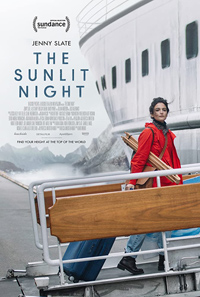Norway Out: Wnendt Paints a Blank Slate in Slight Romantic Drama
 Expectations seemed reasonably high for The Sunlit Night, the English language debut from provocative German director David Wnendt pairing him with the carefree Jenny Slate, a comic virtuoso who works best when digging out the melancholic marrow of life’s funny bone. But perhaps it was a project cursed by a fish out-of-water trifecta, its director and star both strangers in a strange land, whilst scribe Rebecca Knight Dinerstein makes her screenwriting debut adapting from her original source novel.
Expectations seemed reasonably high for The Sunlit Night, the English language debut from provocative German director David Wnendt pairing him with the carefree Jenny Slate, a comic virtuoso who works best when digging out the melancholic marrow of life’s funny bone. But perhaps it was a project cursed by a fish out-of-water trifecta, its director and star both strangers in a strange land, whilst scribe Rebecca Knight Dinerstein makes her screenwriting debut adapting from her original source novel.
Whatever the case, the unassuming narrative relies on familiar tropes of an artist finding their voice amidst quaint and quirky scenarios with Slate relying upon the familiar aspect of the socially awkward persona who succeeds because of and not despite her authenticity.
Frances (Slate), a struggling New York artist, finds herself at a crossroads when everything seems to fall apart at once. Just as her relationship dissolves, she loses out on a prestigious internship in Tokyo, and her younger sister announces her marriage to a suitor her parents (Jessica Hecht, David Paymer) seem to despise—who in turn use the good news as an opportunity to confirm they are getting a divorce. Initially trying to share her father’s incredibly cramped studio, Frances decides to beg for any potential internship which will take her out of New York. And so, she ends up in northern Norway helping the mercurial and once noted artist Nils (Fridtjov Saheim) paint a barn yellow for a public arts project. As luck would have it, she also finds the opportunity to find a subject to paint among the locals while becoming enamored with Yasha (Alex Sharp), in town to bury his father.
Narratives dependent upon the growth and maturation of its protagonists are obviously a dime a dozen, but their formulaic impulses are so well-grooved into the sensibilities of what’s considered acceptable to the 100-105-minute running time they’re almost impossible not to predict.
The Sunlit Night feels like an event horizon, starting and ending just where we would expect it to, while the entirety of its middle section could be collapsed completely since it never succeeds on any of the fronts it professes to (namely that Frances has grown either as an artist or a person, and was able to experience such profundities through her experiences working with a finicky artist and falling in love with a morose love object). But we never really get the sense Frances grows at all, her character development as inert in frame one as it is by the last. Sure, Wnendt and Dinerstein keep telling us that Frances has done something, but it seems about as unsure of what these lessons are as Slate’s performance, more tentative than the ferocious performance which made Obvious Child (2014) so enjoyable. For instance, her attraction to Yasha is presented as completely one-sided, until, of course, they end up naked together in the barn/art installation (the rational of which is equally mysterious since she has her own private sleeping area).
The entirety of this rural Norwegian village in the Arctic Circle is about as quirky as any American might paint it—filled with Viking reenactments courtesy of Zach Galifianakis, who, like a strong-flavored cheese, overwhelms everything else whenever he’s encountered. Or, for whatever reason, Gillian Anderson popping up as a Russian oligarch and estranged mother to Sharp (a similar off-kilter decision to that of Emma Thompson in Last Christmas, 2019).
Sure, there’s much more prestige afforded Wnendt by their presence, but it just simply plays as inauthentic, especially compared to his breakout, the joyously sex/body positive Wetlands (2013) or his 2015 satire Look’s Who’s Back, which imagined the return of Adolf Hitler. Sure, this is gorgeously photographed by DP Martin Ahlgren, but the intrinsic beauty of these hinterlands is hardly a credit to the location or the film itself. For an equally dry but more accomplished journey of a German director descending upon Northern Norway to explore fractured familial issues, try Thomas Arslan’s Bright Nights (2017), a project which may have also benefitted from significant tax breaks filming there.
★½/☆☆☆☆☆


